(We are delighted to present Comrade Aleks‘ extensive interview of Sharon Bascovsky, founder and mainstay of the ground-breaking Pittsburgh death/doom band Derkéta.)
Derkéta was formed in Pittsburgh in 1988 by Sharon Bascovsky (vocals, guitars) and Terri Heggen (drums). Influenced by bands like Sepultura, Death, Massacre, and Bathory on the one hand, and by bands like Black Sabbath and Candlemass on the other, they worked out their own low-tuned and a bit slowed-down death metal, which later transformed into something that was labeled as death/doom metal. Two demos and one EP (1990’s Premature Burial) was all the band recorded before they split up in 1991.
Sharon tried to resurrect Derkéta in 1997, then in 1999… It’s a long story, but finally, the full-length album In Death We Meet was recorded in 2012. Sharon played a few shows with a new lineup, then came a single, Darkness Fades Life in 2014, and then… Actually it wasn’t even clear if Derkéta were still an active band until I wrote Sharon and asked her all the questions I had accumulated through a few years.
Hi Sharon! How are you? What’s going on with Derkéta?
Hi Aleks, I’m doing well, thanks for asking! Right now we are working on some new material and also preparing for some live shows that we have coming up. There are two more recording projects that I’d like to do.
What are these projects?
Since we are playing better as a band, I want to re-record all four of The Unholy Ground demo songs for an EP because they never made it on the full-length, with the original demo songs on the flip side, and call the EP The Unholy Ground Unearthed. We would keep it true to form of course. Then record another full-length of new material. Mary [Bielich] and I have a good chemistry going on and I’m really liking how the new songs are developing. She plays harmonies and will add in different notes to enhance what I’m playing, which really brings the riffs to life. Gives me chills really and that is what I’m chasing with writing, that chilling factor.
Right now I only have those two projects planned as I have carpal tunnel in both of my hands. Both hands/wrists are in pain constantly and I’ve lost strength in them. I need to book in with my doctor again soon but it’s made playing somewhat of a painful challenge, so not sure how much longer I got. Hopefully this is correctable without surgery, as I won’t do surgery. I have a brace for my left hand that I’m supposed to wear when I’m sleeping but I forget to wear it most nights; typical of me.
Sharon, speaking about your roots… What were your musical influences when you started Derkéta? How did you manage to start a band of that kind and gather the full lineup in 1988?
When the band started I was listening to bands like Black Sabbath, Sepultura’s Morbid Visions, Death’s Scream Bloody Gore, Candlemass’ Epicus Doomicus Metallicus, Massacre, and Bathory. I think each of those bands had some sort of influence on me, as I would listen to those bands constantly.
I met Terri [Heggen] at a party and had mentioned to her that id like to start up a band. She said she’d like to start one up too, so we swapped phone numbers and became good friends in the process. Originally she wanted to be the vocalist but her vocals were more on the style of a Fates Warning, and I told her that I was looking more for Kam Lee (Massacre) vocals. When she said she couldn’t do those kind of vocals, I had asked her if there was an instrument that she would like to play. She mentioned she’d like to play drums, so I said OK you can be the drummer. We contacted our friend Jeff Cherep from a local band DoomWatch and started going out to his house to use their drum set and he gave her some basic drum lessons. Then in March of 1989 she was able to buy her own drums and we started rehearsing in my parents’ basement. We didn’t have a full lineup until 1990, but unfortunately that is when we disbanded and started working with other people.
How were you involved in that side of modern culture? The entire band’s image, that tendency to tell horror stories through death metal music — what inspired you? Were you horror movie fans back then? Or did something else drive you to add more gore into the band’s first songs?
I think it may have been the lack of TV channels back then. This was before cable television and my family still only had black and white TVs. We got about 10 channels and on Sunday mornings there was always a horror movie playing. I would get captured into being scared and enjoyed that feeling of being spooked by a ghost. I also started listening to Black Sabbath when I was around 10 years old and I think that set the tone to having spooky sounding metal music. That expression still remains with me to this day, and I believe that most of us that grew up in that time period probably have this similar childhood.
Derkéta – Premature Burial
Can you name some of your favorite movies? Do you have songs with lyrics based on certain screenplays?
As far as horror movies, some of my favorites are Haunted (with Aiden Quinn), The Fall of the House of Usher (with Martin Landau), The Woman in Black (BBC TV Version), Rear Window (I love James Stewart), The Changeling (with George C. Scott), and Ghost Story (with Fred Astaire). Those are the kind of horror movies that I’m drawn to.
The lyrics for Premature Burial were originally drafted by Terri, and I had completed them after watching an Alfred Hitchcock episode called “The Final Escape” where a prisoner made a deal with another inmate who dug the graves for prisoners. He was to get buried with a corpse, and then that inmate was supposed to dig up the grave afterwards and set the prisoner free. The prisoner snuck into one of the caskets on the night planned and after he was buried with a corpse he decided to light a match to see who he was hanging out with, which turned out to be the inmate who was supposed to dig him up. That song is the only one that was inspired by a screenplay. Most of my lyrics are written from phrases that will pop in my head as I’m writing the music. I create a story from those phrases, it’s just random ramblings really. The song “In Death We Meet” is the only song that is written from a personal tragedy/experience.
What are your favorite doom-topics? What kind of songs lyrics do you like most and what is an example of perfect doom lyrics for you?
I guess death and ghostly topics seem to grab my interest. I think what captures me most with doom is the emotions that go along with loss and the beliefs that we develop to cope with that loss. I like when I can empathize with the lyrics as if I’m feeling what the artist is feeling. A really good example of this is from the band Argus and their song “Pieces of your smile”. Its absolutely perfect to me.
They said you left this world at dawn to tread the paths of death
And in your chambers you’re prepared to enter final rest
And in my grief as my mind reeled you seemed as though alive
Driven away by lunacy I swear I saw you smile
What influenced your manner of singing or playing?
I always liked the rougher sounding vocals in general, male and female. Even before metal I really was into Kim Carnes’ vocals, you know the song “Bette Davis Eyes”. Once I got into metal and eventually heard death metal vocals, it seemed like a perfect harmony of what I was drawn to musically. Rough vocals, morbid lyrics, warm-toned guitar sounds that had such a sound of dread, it was the ultimate metal sound for me.
I think the fact that we remain true to what we started out as is our strength. Most people want to progress into variants of themselves, which is fine, but my goal is to chase that original dark feeling that I had for the band.
The band was pretty active back then, you recorded two demos and then there was the Premature Burial EP. What are your memories of this period?
If I had to rate a timeline of my life, I would have to say that time period was the most fun for me. This was when the underground metal scene was magical, and I didn’t have any real responsibilities in life. I lived at home with my parents and it was all about what was going on in the underground metal scene. On the weekends we used to go to downtown Pittsburgh to Eides Records and check out what underground bands they had in stock, then run home to check them out. We would go to shows to check out different bands, or go to metal parties where people would bring their latest tape trading gems. We got to meet others from all around the world who were into the same music as us. And in between all of that we worked on Derkéta.
How did people react to an all-ladies band? How often did you play live?
We weren’t expecting the band to get out globally. We thought it was just going to be something to share with the friends who had already known us. Then we witnessed the power of tape trading and fanzines when we started getting around 10 letters a day from around the world. The reaction was positive for the most part. I remember there being somewhat of a shock as there weren’t many girls who listened to underground metal, let alone writing it. And a female doing death metal vocals was out of the ordinary. There were some letters that were nasty to us, calling us whores and acting like we were nothing but groupies. They didn’t want to give our demo the time of day because we were females, and we couldn’t understand why they were so angry about it. Thankfully there weren’t’t many of them and the majority accepted us into their boys club.
We never played live back then because we didn’t have a full lineup. It was just me and Terri until 1990 and we disbanded shortly after we found other members. When Mary and Heidi [Franks] entered the picture, I wanted us to work on gelling as a band and develop a strong chemistry with one another. I did not want to perform live unless we all had our shit together. Since we were females, we were going to be critiqued more than a male band. We never got to that point. Our first live show wasn’t until 2011, I think, after we had reformed.
The Premature Burial EP was recorded in Alternative Studio and then released by Seraphic Decay Records. How fast did you record this material? What did you want to fulfill on this record?
I can’t remember what was going on around that time but we weren’t rehearsing as much as we should have been. I didn’t have the new songs completed; one song would have been the song “Goddess of Death”, which was then titled “Lost in Sorrow”. The music is slightly different than it was originally, lyrics completely different, but I remember that was the song I was working on at that time. We had a deadline so we thought we would just go in and re-record the demo songs to try and make it heavier, but I like the demo version the best. It actually took us longer to re-record those two songs than it did to record The Unholy Ground four-song demo. It was just an “off” weekend I guess.
You chose to play death/doom metal, and you chose its brutal form. Was this music rooted in traditional doom for you or did you see it rather as slower death metal?
This is a fantastic question Aleks! It was actually slower death metal. I do like traditional doom metal but that is completely different than what Derkéta is all about. The best way for me to describe it is when a death metal song breaks into a sludgy part. To me that is chilling, and that feeling is what I search for when I’m writing for Derkéta. Take for example the song “Critical Madness” by Autopsy, that beginning is what it’s all about for me.
Derkéta split up in 1991 and then resurrected in 1997. What happened? And why was your second reunion so brief?
Terri and I weren’t getting along and weren’t seeing eye to eye on things. She went on to form Mythic and I continued on with Derkéta with a local drummer, Scott Phillips. He was from a band called Death Mass. That was brief though, as his girlfriend had a problem with him rehearsing with me, and so that was that. It’s a shame that had happened because if we would have put out a Derkéta recording then there wouldn’t be the confusion of people thinking Derkéta and Mythic were the same band.
I ran into Terri at a local bar around 1997 and we started talking again. Whatever issues we had with each other seemed to have passed and it felt like old times. I had mentioned to Don [Crotsley] from NunSlaughter that Terri and I were talking again, and he asked us to record something to put out on a split 7” with them. He said the underground death metal scene was starting to make a comeback after that whole black metal movement and our kind of music was now called “old school death metal”.
I asked Terri if she would be interested in recording again and that I had unrecorded songs. She agreed, so we started rehearsing over at her house. We had a good chemistry going on and I was real happy that we had reunited and was happy with what we were working on. She had a friend with a studio basement but he didn’t understand this style of music. He kept saying we were playing “’80s death metal and that was out of style” and that “goth music was in”. He was very arrogant and rude to me; kept cutting me down, my playing, my vocals, and I remember looking over at Terri for back-up support and she said to me ,“listen to him, he knows what hes talking about.”
I didn’t understand what was going on. We recorded and then I eventually left. I had enough. I made the mistake of leaving my lyric sheet there. The next day I called Terri to talk to her about it all, for us to go to another studio to record, but she informed me that they accidentally erased half of my vocals and she sang it instead. They wrote keyboard parts over it, mixed it, and had it overnighted to get pressed.
I was in shock and when I told her that I didn’t agree with that and wanted to redo it, she told me she didn’t have time for this shit and we stopped being friends again. I immediately called Don and told him to ship that back to me and that I had to pull us off of the release. It was supposed to be a Halloween release with glow-in-the-dark vinyl; Dekapitator ended up being on that release instead. Shortly after this I received a phone call from Jim Konya (RIP), who was the drummer of NunSlaughter. He had offered to take over on drums, so I started driving to Cleveland, Ohio on the weekends to rehearse with him.
Derkéta – In Death We Meet
The second Derkéta reunion seems to have been more successful — at least it hasn’t disbanded since then — but there were just two splits in a long period. What slowed you down?
Just life in general. The band is just a hobby now. We all have full-time jobs with busy schedules and I’m very easily distracted from writing. I have a lot of responsibilities and there’s lots of chatter going on in my head ’cause of it all.
Sharon, how do you see the role of women in doom music? What are the contributions of women in that genre besides the endless inspiration that makes men write songs about their broken hearts and burning witches?
I don’t really see a difference in the roles between men and women in any kind of music. I’ve been asked a lot of questions over the years because I’m a female in a male-dominated scene and I think both genders are trying to accomplish the same thing really. From a female perspective, I don’t feel any different and can relate to a male when it comes to the areas of musical creativity. I don’t see it as a guy thing. I think if I had to come up with a difference though, to separate the men from the women, it may be that women aren’t as afraid to get into touch with deeper emotions, and if that can be articulated musically then it could be really heavy. I’m not saying I have done that, but it’s something that I can see as a contribution to the male-dominated genre.
Do you ever deal with drunken fans who tell you words of confession and adoration during your gigs?
It’s very rare to be honest. Most people are very respectful to us. There are a few times when someone will have had too much to drink and may be a little over-the-top, but they act that way with everyone so its not so special!!
Do you care about your appearance during gigs?
Well, to a point I guess. I don’t want to look like a total slob in photos; seeing horrible pictures of myself will bring me down. I don’t have “stage clothes” — we’re not a fancy band — but there are certain clothes that I will lean towards that I feel comfortable in. There are times when I’ve seen photos of myself after a show and thought that I’m definitely not gonna wear that shirt again because it was so boxy it made me look fat. So, yeah, I care. It’s the same thought process as my everyday image though; dumb self-esteem stuff.
Sharon, what’s the full story of the In Death We Meet album? It’s said that it contains unreleased songs that were written between 1991 – 2010. How did you decide that finally it was the right time to bring it on?
After Terri and I split up in 1997, I had recorded a few songs with Jim Konya. He had changed the tempo of the songs to make it more to what he was into, but they never felt right to me. I missed the chemistry that Terri and I had and wanted to record the other songs with her, so I waited around until she agreed to do them.
Initially she was afraid of the band messing up our friendship again, so she kept saying no. I think we were at an Obituary show and Terri approached me saying she wanted to record again. Robin Mazen was doing merch on that tour, I told her Terri had just agreed to do Derkéta again, and Robin said she wanted to do it too, but wanted to play bass and for us to talk Mary into playing guitar so we would finally play live. And that is how it all came about.
Unfortunately, Terri was right that the band was going to ruin our friendship but I am happy that she and I were able to record again. For the record, I have no issue with Terri personally. It’s outside interferences which I’m not going to discuss. We now have Mike Laughlin on drums; he played in Cattle Decapitation and Creation is Crucifixion. Mike has been with us since 2012. We also have Trish Muszynski-Bill as a back-up bassist for when Robin isn’t available to play live due to other commitments.
The album was recorded in two sessions. Did you record it together as a band? Did you change much of the original ideas in the studio?
You must be talking about our first recording attempt. Originally Terri’s husband was recording us but he and I were in a disagreement with the recording, so I had to walk away from that. We went to another studio and started all over. The way we do it is I play a scratch guitar track along with the drums. Then we go back and record our guitars and bass tracks to the drum tracks, then vocals. I wasn’t happy with my guitar sound at this studio, so I went to another studio to record my guitar tracks. Then I wasn’t happy with his mix, so had to go back to the studio where we started the recording to have it all mixed.
I’ve had too many recordings in the past that I wasn’t 100% happy with, and no longer wanted to settle. I’m very particular now, which I know is annoying for the others. A couple of years after our release I ended up having the recording remixed by Ola Lindgren from Grave for the vinyl release of In Death We Meet. I am 100% happy with it and also released the remix on CD with bonus tracks.
Some of the original ideas were changed slightly once Terri and I started rehearsing together. She would play a drum beat that would inspire me to change something to match what she was playing.
Derkéta – live
You released In Death We Meet on your own. What made you to choose this way? Didn’t you have any proper label in sight?
We were contacted by a few labels, but the bigger labels all needed us to tour and we have full-time jobs where we can’t just take off and tour like that. The smaller labels weren’t really offering us anything that was beneficial to us. It seemed like it was all a hassle, so we decided to just release it ourselves. We had already paid for the recording and that was the biggest expense of it anyway. Ibex Moon Records (John McEntee from Incantation’s label) released the remix version though.
How did the album release change the situation around the band? Did promoters start to annoy you with invitations to big fests and so on? How did you feel about it?
No, nothing changed. We found out that most of the bigger fests have deals with labels to feature their bands. We’re not a label band and are still the underdogs I guess. The people who ask us to play shows are just hard-core fans/promoters. We finally got asked to play a bigger fest, the Kill Town Death Fest in Copenhagen. That only took 30 years to happen!
Derkéta’s latest release is the Darkness Fades Life 7” vinyl single (2014), and there are 25 years between this record and your first Official Rehearsal demo. How did your vision of the band, and of music, change through this period?
It hasn’t. I’m still that same person with the same thoughts and the same vision. I just want to improve on that same original idea without changing that core vision. I can’t be something that I am not.
Sharon, do we have a chance to get new songs from Derkéta in the forthcoming future?
Yes, we are working on them now. It’s coming along more slowly than we would like because life keeps throwing distractions at me which disrupts my writing thought process. We have three or four songs that we’re working on currently, but we also have to prepare for some live shows that are coming up. We can only rehearse about an hour or two a week, and going over our live set eats up most of our time. If we don’t record later this year, we’ll record early next year. Then we’ll see where we go from there.
Thanks for your time Sharon! Much appreciated! So let’s resume – what’s the ultimate message of Derkéta?
I’d like to thank those people who are still interested in what we’re up to, and who can look past our gender and appreciate our efforts. It’s always been about having music and lyrics of morbid thoughts floating around in my head and interpreting them into song form to stop the “nagging” that a song is in waiting. There is a lot of time and money involved in making it all happen and we are thankful that people care. If you’re interested in following us, find us on Facebook or go to our website www.derketa.com. Thank you Aleks for reaching out to me for the interview, it’s appreciated! Take care!
https://www.facebook.com/DerketaDoomDeathMetal

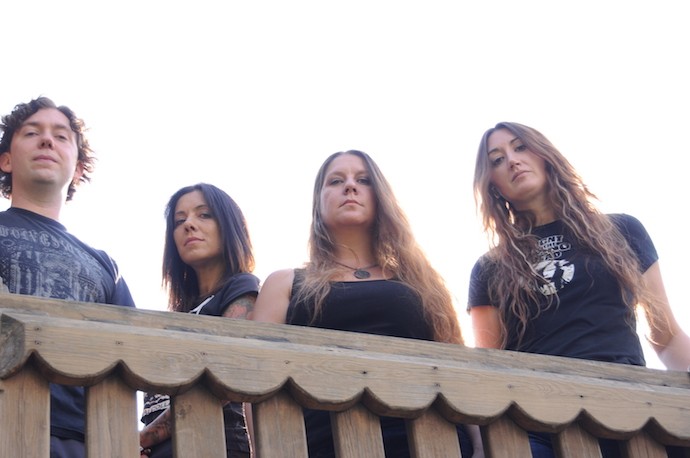
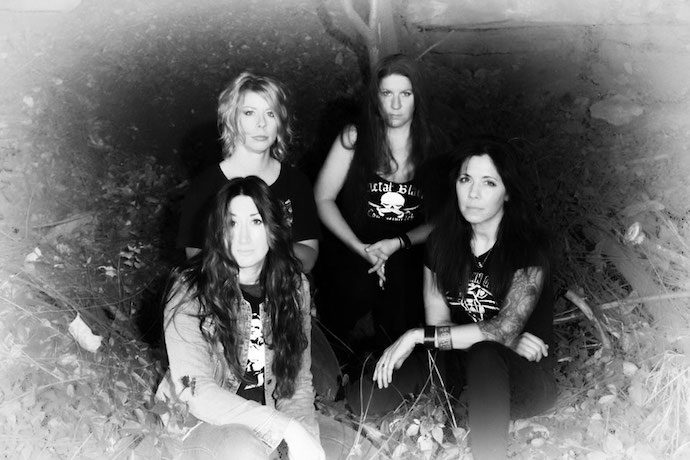
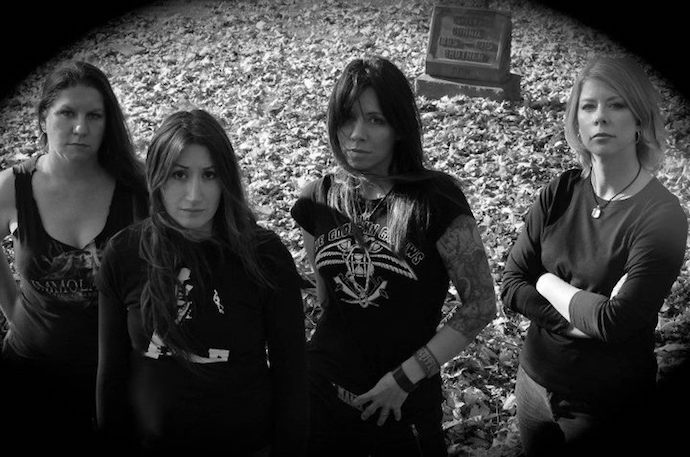
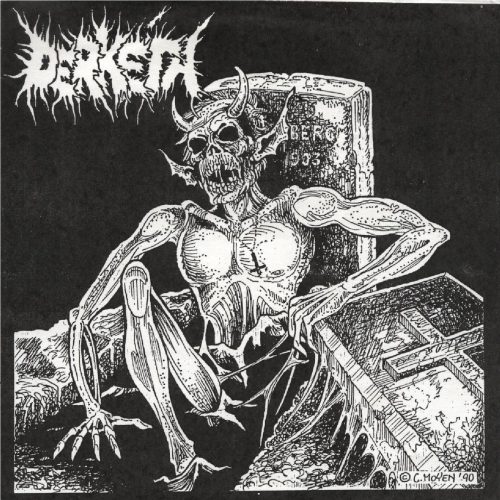
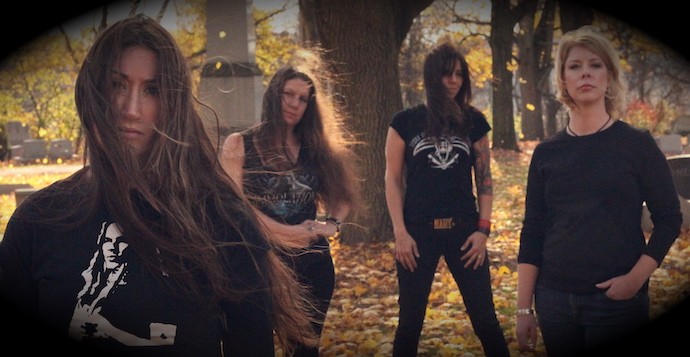
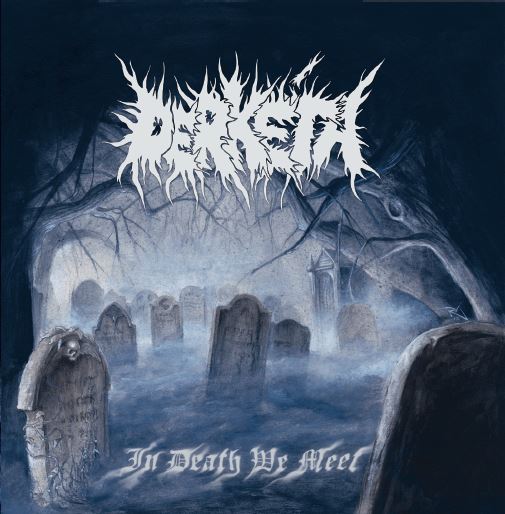
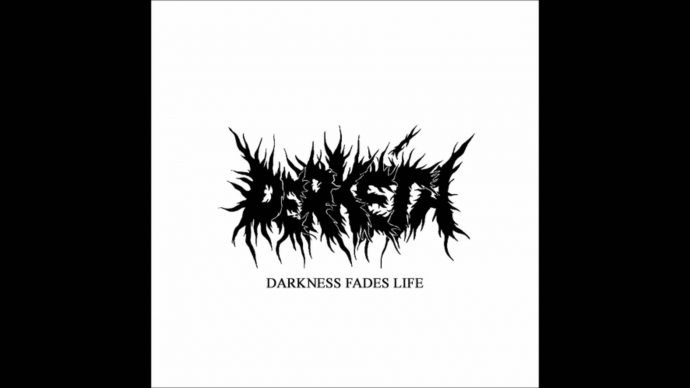
Great read. I’m really looking forward to seeing Derketa at Migration Fest!
Great interview! Great band!
All hail, Derketa! Great band, amazing live!
I’m from an area near Pittsburgh in Western PA. I was born in 85 so the whole tape trading scene didn’t exist for me growing up (Napster was starting though) and discovering of Derketa in general was a very late thing in life, which is rather astonishing as a metalhead growing up in the area. I had no idea until reading this that they hadn’t played any shows until 2011, and that is answers my age-old question of, “How the hell hadn’t I even heard the name listed on shows throughout the years?”
I was borderline dumbfounded when casually searching Metal Archives for bands from Pittsburgh, I saw them, the year, what they played, and that they were female. Downloaded everything in existence I possibly could (everything prior to In Death We Meet, this was a couple years prior). They opened our stop on the 2013 Decibel Tour with Carcass and it was sincerely one of the most crushing sets I had ever heard/witnessed. Jaw was dropped. To this day, I hope to hell I can catch them again.
Thanks Chris! We play Friday, July 27th at the Migration Fest at Mr Smalls, we go on at 7pm. Then our next show in Pittsburgh is at Skull Fest, Saturday August 18th at Cattivo. Show starts at 9pm.
Thanks Chris! We play Friday, July 27th at the Migration Fest at Mr Smalls, we go on at 7pm. Then our next Pittsburgh show is Skull Fest on August 18th @ Cattivo. Dhow starts at 9pm.